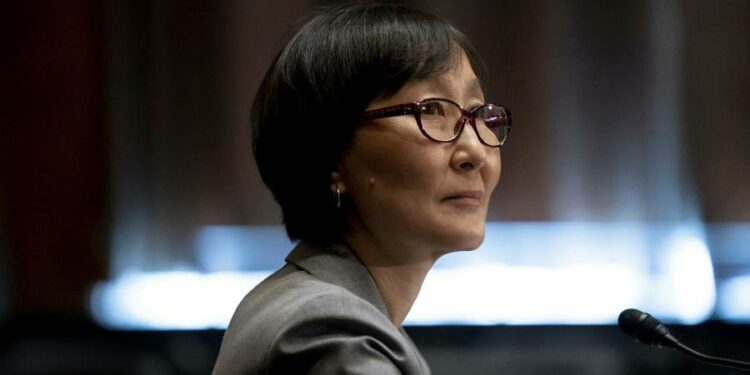Saule Omarova, Joe Biden’s pick to head a big US bank regulator, has withdrawn her nomination, dealing a blow to the White House after it had defended her amid pushback from Congress and Wall Street over her academic writings and her upbringing in the former Soviet Union.
“I nominated Saule because of her deep expertise in financial regulation and her longstanding, respected career in the private sector, the public sector and as a leading academic in the field,” Biden said on Tuesday in a statement.
“But unfortunately, from the very beginning of her nomination, Saule was subjected to inappropriate personal attacks that were far beyond the pale.”
Biden announced in September that he intended to appoint the Cornell University law professor to lead the Office of the Comptroller of the Currency, which supervises US national banks.
She faced a backlash from Republicans and the banking industry, with critics focusing on her upbringing and her career as an academic with proposals including a state-run bank account system.
Omarova in a letter said that it had been a “great honour” to be nominated. “At this point in the process, however, it is no longer tenable for me to continue as a presidential nominee.”
In an interview with the Financial Times in October, Omarova, who was born in what is now Kazakhstan, accused some of her critics of racism and of targeting her for being a minority candidate as well as a woman.
But she said she believed the criticism had been motivated more by fears of her tightening banking regulation than her gender or her ethnicity.
“What Wall Street banks worry about is that I am going to be an independent, strong-minded regulator who is not one of them, who is not beholden to them,” she told the FT.
Some of the most intense attacks against Omarova came from Republican lawmakers. John Kennedy, the Republican senator from Louisiana, told Omarova during her confirmation hearing last month he did not know whether to call her “professor” or “comrade”.
Pat Toomey, the most senior Republican on the Senate banking committee, said at the time that Omarova would “end banking as we know it” and cited her undergraduate thesis on Karl Marx as evidence that she was a “radical” choice.
Omarova responded that she was not a “communist” and could not choose where she was born.
Scepticism from some moderate Democrats, however, which came to light during the confirmation hearing, became a crucial factor in jeopardising her prospects in a Senate that is evenly split between the parties.
Both Jon Tester, a Democratic senator from Montana, and Mark Warner, of Virginia, voiced concerns during the hearing about Omarova’s previous criticism of aspects of a 2018 bill they had championed that had relaxed regulations for community banks.
Tester also questioned her proposal for a state-backed national investment authority, which he said could decide which sectors of the economy to lend money to.
Toomey on Tuesday said in a statement a “bipartisan consensus” had emerged on Omarova’s ideas about the US financial system being unsuitable. “I hope the Biden administration will select a nominee with mainstream views about the American economy,” he added.
Omarova’s supporters have condemned the backlash against her as character assassination.
“Despite her unquestioned expertise and her bipartisan record, powerful interests distorted Professor Omarova’s views and writings,” said Sherrod Brown, the Democratic Senator from Ohio and chair of the Senate banking committee, in a statement on Tuesday.
“In a relentless smear campaign reminiscent of red scare McCarthyism, they have shamefully attacked her family, her heritage and her commitment to American ideals,” he said, adding that the OCC required regulators “who are not in the pockets of Wall Street”.











